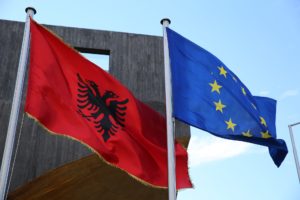
The first time Albania applied for EU candidacy, upon joining NATO in 2009, it got turned down, not once but twice, on the basis of the inadequacy of its democratic reform process and its ineffectiveness in fighting organized crime and corruption. Six years later, Prime Minister Edi Rama sees the EU integration process as the only way for Albania to get out of the vicious circle it has been trapped in, and start laying down the foundations of a modern democratic state.
Albania’s history has indeed been clustered with an exceptional string of challenges: scourged for centuries by foreign dominations, including by the Romans, the Serbians, and the Ottomans, then firmly in the grip of communism for five decades thanks to dictator Enver Hoxha, Albanians were long deprived of the most basic human and civil rights, growing largely isolated from the rest of the world.
Making reference to that period, Rama highlights, “It disrupted the very core texture of our society and seriously hampered our institution-building process.” Then adds, “Against such a background, integrating within the EU became the only safety belt we could embrace, to start patching up the puzzle of mechanisms that a functioning democratic nation requires.”
Relentlessly bullied and brutally oppressed, yet never entirely defeated, Albania has developed the fiber survivors are made of. Resilient as it may be though, breaking free from the stranglehold of the past and embarking on its new path towards a more open economy has been anything but easy for the small Balkan nation.
For years, the country’s growth model has largely relied on foreign remittances and a domestic construction boom, fuelled by the people’s attempt to regain ownership of what they perceived as their dispossessed properties during the Hoxha regime. After weathering the global financial crunch reasonably well, a stalled Eurozone economy, especially in recession-hit Greece and Italy where a large Albanian diaspora lives, has opened a crack in the cash funnel feeding Albania, exposing the system to a series of vulnerabilities. That, coupled with its existing structural weaknesses, placed the economy under increasing pressure.
When it comes to the EU accession process, Albania has some catching up to do. Concepts like accountability, transparency, compliance with the law, ethical and fair business practices, international standards, widely adopted and implemented throughout the EU community, are still fuzzy words in the vocabulary of the average Albanian entrepreneur or public servant. The path ahead is a steep one and Rama is well aware of it. Since taking office in September 2013, he has enacted a series of strong measures to crack down on corruption, cronyism, and widespread informality, including the massive tearing down of illegal constructions and the exemplary punishment of electricity theft and other violations by severe fining and even incarceration.
However harsh such measures may appear or feel, he views this shock therapy as an essential instrument to set the country on the right path, and ultimately raise the living standards of its people to more acceptable levels. If the universal truth, that having a sound rule of law builds confidence in the nation’s institutions, leading to higher productivity and economic development, holds true, the Prime Minister may have just found the right formula to turn the country’s fate around, in the medium to long term.
The government has identified energy, agriculture, tourism, and manufacturing as Albania’s primary sources of sustainable growth and FDI, though further diversification is key to boosting competitiveness going forward. Having a safe and efficient transport and infrastructure system is also a priority, and Public-Private Partnership (PPP) is viewed as a vital tool to achieve this goal. Hence, the importance of foreign investors and the support of the EU, with regards to the modernization of seaports, the upgrading of the national grid, and the strengthening of intraregional connectivity through an integrated intermodal transport network. The man in charge of this process, Minister of Transport and Infrastructure Edmond Haxhinasto shows confidence, “As an active promoter of good neighborly relations across the region, Albania is in a unique position to promote projects that are beneficial to all.”
According to the authorities, the existing national laws on concessions and public procurement meet European standards. Thus, they guarantee the transparency of deals, the accountability of officials, and, most importantly, level playing fields for both local and foreign investors.